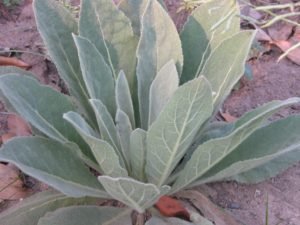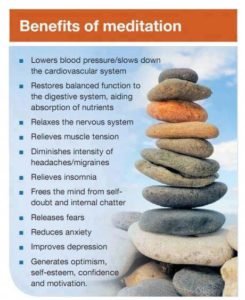by Susan Dean | Feb 3, 2018 | Herbs, Kitchen Recipes, Medicinal Recipes

Mullein flowers and leaves are favorite natural remedies. They have been used to combat colds, bronchitis, flu, emphysema and laryngitis among others. As a relaxing expectorant, mullein contains saponines that soothe bronchial spasm to clear out sticky phlegm and thick mucus. As a mild sedative, mullein fights inflamed nerves along the respiratory tract and relieves pain.
Licorice is a demulcent herb containing vegetable gum to lubricate surfaces. It softens and moistens irritated inflamed mucous membranes and reduces spasms that trigger coughing. Licochalcone A, a flavonoid in licorice root, known for its antimicrobial property, promotes anti-inflammatory activities to prevent cancer cell proliferation and improves acute lung injury. The active ingredients in licorice significantly drive down inflammatory cells, lung wet-to-dry ratio and protein leakage.
Gingko Biloba has a protective value on lung injury. Gingko biloba extracts stimulate systematic inflammatory response in lung tissue.
Echinacea is an anti-microbial herb that fights pathogenic microorganism while strengthening the immune system. It works by activating white blood cell production and aggressiveness. A formulation of Echinacea can reverse infection caused by the rhinovirus in human airway epithelium and improves the mucous secretion stimulated by rhinovirus. Echinacea may reduce mucus production during colds.
Rosemary is an anti-microbial herb that has antiseptic, antibacterial and anti-fungal properties. Rosemary has been used for alleviating colds, sore throats, flu, coughs, bronchitis and chest infections. Rosemary contains carnosol which possesses selective toxicity towards cancer cells without destroying non-tumorigenic cells
Eucalyptus oil treats various respiratory conditions including influenza, meningitis, common colds, fever, sore throat, sinusitis and bronchitis. It is known for its powerful antiseptic, expectorant, vermifuge, analgesic, decongestant, anti-inflammatory, antispasmodic and antiviral properties. Eucalyptus is beneficial to the lungs because of cineole. This active ingredient is a powerful expectorant that eases coughs and fights various types of respiratory problems. One study showed that intake of 200 grams of cineole three times a day helped improve the symptoms of viral sinusitis. A study in Spain claimed eucalyptus brings about anti-inflammatory effects because it inhibits the production of nitric oxide. Eucalyptus has antioxidant properties that strengthen the immune system.
Irish Moss is capable of treating a host of respiratory illnesses. It is one of the core ingredients of many prescriptions drugs used to treat bronchitis, and other lung problems. This herb is an excellent source of magnesium, iodine, sodium and calcium and it is noted for its anti-viral properties that help fight against mumps and influenza B viruses. Irish moss has anti-inflammatory, demulcent and expectorant properties. It is used to speed up recuperation from illnesses like pneumonia and tuberculosis. Irish moss abates the symptoms of common colds and flu. In addition to its ability to relieve unproductive dry coughs, Irish moss contains potassium chloride that dissolves catarrhs, responsible for congestion associated with coughs.
Hyssop is known for its anise=like aroma and contains expectorant properties that eliminate congestion of the lungs caused by sinusitis and other viral infections. Hyssop has antioxidant, anti-inflammatory and diaphoretic properties that are known to help reduce fever and get rid of toxins in the body. Hyssop syrup relieves stubborn coughs and other pulmonary infections. Hyssop can treat lung problems which include cough, cold, and asthma, as well as fever, stomach problems, bruises, inflammation, and high blood pressure.
Slippery Elm is known to treat a wide range of health conditions and makes an excellent herb for the entire respiratory system. It’s perfect blend of anti-inflammatory, antiseptic, mucilage, diuretic, emollient, laxative and expectorant properties make it a good herb for the lungs. It is beneficial in treating bronchitis, bleeding from the lungs, coughs, and in soothing mucous membranes. This herb contains anti-allergenic and antiseptic properties making it effective in treating asthma. By softening mucous membranes in the nose, slippery elm offers immense relief to different respiratory conditions.
Coltsfoot is a powerful herb that can be very beneficial to the lungs. Coltsfoot makes an excellent remedy for whooping cough, common colds, and other types of lung ailments. This herb relieves the symptoms of bronchitis, healing the mucous membranes, and is a potent expectorant. Its anti-inflammatory effects enable fast recovery of infected and irritated lungs and the respiratory system in general.
Healthy Lungs Tea
Mullein helps clear mucus from the body, eases sore throats, and helps bronchitis.
Fenugreek is anti-inflammatory, promotes mucus production and clearing, soothes sore throat and eliminates built-up mucus.
Dandelion root is an anti-inflammatory, fights fungus, cleans the respiratory system and clears mucus, stimulates kidneys and liver.
This is a genera health-promoting tea, along with fresh juice (like pineapple-kale-ginger and juice the pineapple’s core). Pineapple juice is beneficial for coughs/mucus in the body too and the bromelain in the core is anti-cancer.
Drink in the mornings to promote health, or a few times throughout the day if you have a cold.
6 parts mullein leaf
1 part fenugreek seed
1 part dandelion root
Combine all herbs in a glass jar and shake to combine. Use 1 tbsp. (for tea) or a handful (1/2 c. or so, for infusion) and add to 1 – 2 c. boiling water. Let it steep 10 – 20 minutes. Strain it, then sweeten lightly with raw honey or drink it straight.
by Susan Dean | Feb 3, 2018 | Herbs, Kitchen Recipes
 Parsley, Tarragon, and Lemon Thyme Chicken
Parsley, Tarragon, and Lemon Thyme Chicken
1Tbl chopped parsley
2 tsp dried tarragon
2 stalks of lemon thyme leaves
1 tsp grated lemon zest
1 tsp sea salt1 tsp ground black pepper
Mix all together, sprinkle on chicken, dot with butter. I also like to mix everything in the butter good and then spread it on before baking.
Fennel and Thyme Rub for Fish
½ T Parsley
2 tsp dried fennel or dill seeds crushed
2 stalks of thyme leaves
1 T lemon juice
¼ tsp ground white pepper
Oregano, Citrus, Rosemary for Lamb
1 tsp chopped oregano
2 tsp lemon zest
small garlic clove crushed
½ tsp ground cumin
1 tsp chopped rosemary
1 T chopped cilantro
salt and pepper
Sage and Parsley Coating for Poultry
2 cloves of garlic smashed
sea salt
8 chopped sage leaves
2 T chopped parsley
1 tsp thyme
1 tsp winter savory
t tsp peppercorns
1 ½ oz soft butter
2 T olive oil
Mash and crush together the dry ingredients then add to butter and oil. Coat the poultry and cover loosely with plastic wrap to chill for 30 minutes before baking.
Cilantro and Mint Coating for Lamb
2 garlic cloves
1 tsp cumin seeds
½ tsp ground cumin
½ tsp ground coriander
T chopped cilantro
1 tsp dried mint
1 tsp lemon zest
3 T olive oil
2 tsp rosemary
sea salt and ground pepper
Blend in a processor or blender ( stir the rosemary in ) Spoon onto lamb and cover the surface. Cover and chill 30 minutes before cooking.
Horseradish and Bay Leaf Recipe for Beef
1 clove of garlic
1 tsp peppercorns
1 tsp mustard seeds
2 tsp grated horseradish
2 finely chopped bay leaves
1 T chopped parsley
1 T olive oil
2 T soft butter
sea salt
Mix in processor, smooth over meat, cover and chill 30 minutes before cooking
by Susan Dean | Feb 2, 2018 | Health, Kitchen Recipes, Medicinal Recipes

10 REASONS TO DRINK MORE WATER:
We should drink more pure water every day. The absolute purist water is distilled water. Drink water on an empty stomach. When you drink a lot of liquid with a meal it dilutes your digestive enzymes and makes your digestion less effective. Get yourself a BPA free water bottle and carry it with you. .
-
-
- Our blood is over 80% water
- Our bones are over 50% water
- Drinking more water helps lessen pain in the body by getting the lymphatic system moving
- Water helps eliminate wastes and toxins from the body
- Water lubricates joints and reduces joint pain
- Water regulates your metabolism
- Water balances body temperature
- Water helps ensure adequate electrical functioning of the nervous system
- Water elleviates dehydration
- Every cell in the body requires adequate water to function properly
Staying hydrated keeps your memory sharp, your mood stable and your motivation intact. When you’re well-hydrated, you can also think through a problem more easily. Researchers hypothesize that not having enough water could reduce oxygen flow to the brain or temporarily shrink neurons — or being thirsty could simply distract you.
Water keeps your throat and lips moist and prevents your mouth from feeling dry. Dry mouth can cause bad breath and/or an unpleasant taste, and can even promote cavities.
Dehydration lowers your blood volume, so your heart must work harder to pump the reduced amount of blood and get enough oxygen to your cells, which makes everyday activities like walking up stairs — as well as exercise — more difficult.
When you’re well hydrated, the water inside and outside the cells of contracting muscles provides adequate nutrients and removes waste efficiently so you perform better.
Water is also important for lubricating joints. Contrary to popular belief, muscle cramps do not appear to be related to dehydration, but, instead, to muscle fatigue, according to Sam Cheuvront, Ph.D., an exercise physiologist for the U.S. Army Research Institute of Environmental Medicine.
When a person is severely dehydrated, skin is less elastic. This is different than dry skin, which is usually the result of soap, hot water and exposure to dry air.
The easiest thing that anybody could do on a daily basis is monitor their urine color,” says Douglas Casa, Ph.D., A.T.C., who studies hydration at the University of Connecticut. “Lighter urine color — like lemonade — means you’re generally well-hydrated. If it’s darker, like apple juice, you are most likely dehydrated.”
Staying hydrated keeps your memory sharp, your mood stable and your motivation intact. When you’re well hydrated, you can also think through a problem more easily. Researchers hypothesize that not having enough water could reduce oxygen flow to the brain or temporarily shrink neurons — or being thirsty could simply distract you.
Your kidneys need water to filter waste from the blood and excrete it in urine. Keeping hydrated may also help prevent urinary tract infections and kidney stones. If you are severely dehydrated, your kidneys may stop working, causing toxins to build up in your body.
And, no, unfortunately, drinking lots of water won’t prevent wrinkles.

10 Benefits of Drinking Warm Lemon Water
- Boosts your immune system: Lemons are high in vitamin C, which is great for fighting colds. They’re high in potassium, which stimulates brain and nerve function. Potassium also helps control blood pressure.
- Balances pH: Drink lemon water everyday and you’ll reduce your body’s overall acidity. Lemon is one of the most alkaline foods around. Yes, lemon has citric acid but it does not create acidity in the body once metabolized.
- Helps with weight loss: Lemons are high in pectin fiber, which helps fight hunger cravings. It also has been shown that people who maintain a more alkaline diet (see #2) lose weight faster.
- Aids digestion: Lemon juice helps flush out unwanted materials. It encourages the liver to produce bile that is an acid that required for digestion. Efficient digestion reduces heartburn and constipation.
- Is a diuretic: Lemons increase the rate of urination in the body, which helps purify it. Toxins are, therefore, released at a faster rate that helps keep your urinary tract healthy.
- Clears skin: The vitamin C component helps decrease wrinkles and blemishes. Lemon water purges toxins from the blood which helps keep skin clear as well. It can actually be applied directly to scars to help reduce their appearance.
- Freshens breath: Not only this, but it can help relieve tooth pain and gingivitis. The citric acid can erode tooth enamel, so you should monitor this.
- Relieves respiratory problems: Warm lemon water helps get rid of chest infections and halt those pesky coughs. It’s thought to be helpful to people with asthma and allergies too.
- Keeps you Zen: Vitamin C is one of the first things depleted when you subject your mind and body to stress. As mentioned previously, lemons are chock full of vitamin C.
- Helps kick the coffee habit: After a glass of hot lemon water, you won’t crave coffee in the morning.
by Susan Dean | Feb 2, 2018 | Health, Kitchen Recipes, Medicinal Recipes

LAUGH – IT’S GOOD FOR YOUR HEALTH!
The field of gelotology is exploring the benefits of laughter. It was brought to the public’s awareness in Norman Cousins’ memoir Anatomy of an Illness. Cousins found that comedies helped him feel better and get some pain-free sleep. That’s because laughter helps the pituitary gland release its own pain-suppressing opiates. What can laughter do?
· Lowers blood pressure
· Increases vascular blood flow and oxygenation of the blood
· Gives a workout to the diaphragm and abdominal, respiratory, facial, leg, and back muscles
· Reduces certain stress hormones such as cortisol and adrenaline
· Increases the response of tumor- and disease-killing cells such as Gamma-interferon and T-cells
· Defends against respiratory infections–even reducing the frequency of colds–by immunoglobulin in saliva.
· Increases memory and learning; in a study at Johns Hopkins University Medical School, humor during instruction led to increased test scores
· Improves alertness, creativity, and memory
Humor and creativity work in similar ways, says humor guru William Fry, M.D., of Stanford University–by creating relationships between two disconnected items, you engage the whole brain. Humor works quickly. Less than a half-second after exposure to something funny, and electrical wave moves through the higher brain functions of the cerebral cortex. The left hemisphere analyzes the words and structures of the joke; the right hemisphere “gets” the joke; the visual sensory area of the occipital lobe creates images; the limbic (emotional) system makes you happier; and the motor sections make you smile or laugh. So let’s laugh. What makes you laugh?
Smile . . . .
Smiles improve your appearance. Think about how you feel about a person frowning and a person smiling – who’s the most pleasing?
Smiles say more than words can. A smile can restore your balance. It lets others know you are comfortable with them, and that you willingly agree to make amends where needed.
Smiles create trust and rapport. A smile is a way of establishing mutual feelings of being on the same page, whether one-to-one or in a group. It says “I’m OK, you’re OK, and we’re all going to enjoy one another’s company.”
Smiles make you feel good. Even if you’re feeling a little blue, insert happy thoughts into your mind and just add that smile. It will trick your mind into feeling better, as endorphins are released to reduce physical or emotional stress. Have a beautiful life!





by Susan Dean | Feb 2, 2018 | Health, Kitchen Recipes, Medicinal Recipes
Lose not the advantage of solitude, and the society of thyself. -Thomas Browne’

It is as important to cultivate your silence power as it is your word power. William James
Mindfulness Meditation Linked with positive brain changes
It Makes Your Brain Plastic
Quite literally, sustained meditation leads to something called neuroplasticity, which is defined as the brain’s ability to change, structurally and functionally, on the basis of environmental input. For much of the last century, scientists believed that the brain essentially stopped changing after adulthood. But research by University of Wisconsin neuroscientist Richard Davidson has shown that experienced meditators exhibit high levels of gamma wave activity and display an ability — continuing after the meditation session has attended — to not get stuck on a particular stimulus. That is, they’re automatically able to control their thoughts and reactiveness.
It Increases Gray Matter
A 2005 study on American men and women who meditated a mere 40 minutes a day showed that they had thicker cortical walls than non-meditators. What this meant is that their brains were aging at a slower rate. Cortical thickness is also associated with decision-making, attention and memory.
It Can Be Better Than Sleeping
In a 2006 study, college students were asked to sleep, meditate or watch TV. They were then tested on their alertness by being asked to hit a button every time a light flashed on a screen. The meditators did better than the nappers and TV watchers — by a whole 10 percent.
It’s Better Than Blood Pressure Medication
In 2008, Dr. Randy Zusman, a doctor at the Massachusetts General Hospital, asked patients suffering from high blood pressure to try a meditation-based relaxation program for three months. These were patients whose blood pressure had not been controlled with medication. After meditating regularly for three months, 40 of the 60 patients showed significant drops in blood pressure levels and were able to reduce some of their medication. The reason? Relaxation results in the formation of nitric oxide that opens up your blood vessels.
It Can Protect Your Telomeres
Telomeres — the protective caps at the end of our chromosomes — are the new frontier of anti-aging science. Longer telomeres mean that you’re also likely to live longer. Research done by the University of California, Davis’ Shamatha Project has shown that meditators have significantly higher telomerase activity than non-meditators. Telomerase is the enzyme that helps build telomeres, and greater telomerase activity can possibly translate into stronger and longer telomeres.
It Can Slow The Progression Of HIV
A 2008 study on HIV positive patients found that, after an eight-week meditation course, patients who’d meditated showed no decline in lymphocyte content compared with non-meditators who showed significant reduction in lymphocytes. Lymphocytes or white blood cells are the “brain” of the body’s immune system, and are particularly important for HIV positive people. The study also found that lymphocyte levels actually went up with each meditation session. However, due to the small sample size — only 48 volunteers — it’s harder to draw definitive conclusions.
It’s Pain Relieving Properties Beat MorphIne
Earlier this year, a study conducted by Wake Forest Baptist University found that meditation could reduce pain intensity by 40 percent and pain unpleasantness by 57 percent. Morphine and other pain-relieving drugs typically show a pain reduction of 25 percent. Meditation works by reducing activity in the somatosensory cortex and increasing activity in other areas of the brain. This study also had a small sample size, making it harder to draw definite conclusions.


by Susan Dean | Feb 2, 2018 | Health, Kitchen Recipes, Medicinal Recipes
Going through a whole body detox to clear your issue and symptoms is often needed to truly feel your best. Consuming whole foods, high in raw fruit and vegetables, and removing processed foods from your diet is the way your body can heal. Some of the natural ways:
Aching Joints (arthritis, joint pain, gout): stinging nettles (make into a tea and use topically for painful joints), cayenne pepper, grape juice, celery, comfrey, rosemary, St. John’s Wort
Aching Muscles: consume magnesium rich foods like spinach, swiss chard, squash and pumpkin seeds, sunflower seeds, almonds, cashews, sesame seeds and flax seeds. You can rub apple cider vinegar on muscle/cramps or use essential oils like basil, and marjoram.
Acidity: eat a high-alkaline diet rich in leafy greens and herbs. Cloves help with gastritis, and mint helps combat acidity and indigestion.
Acne: caused by bad diet, lots of processed foods – reduce amount of processed foods consumed and follow a whole foods, high raw lifestyle to help detox and regenerate the body. Tea tree oil helps combat acne since it is a strong antibacterial. Apply tea tree oil directly to your blemish in a little bit of carrier oil like jojoba oil.
Allergies (i.e., Hay Fever): make teas to help reduce allergen symptoms. Drink teas like nettle, and echinacea.
Alzheimer’s Disease: rosemary and high-antioxidant foods like berries help strengthen neuronal connections in the brain.
Anti-inflammatory (arthritis, gout, inflammatory diseases): ginger, cayenne, and turmeric; these three foods combat the inflammatory response in the body.
Anxiety: calm your nerves with chamomile and lavender. Practice breathing techniques, meditation & yoga.
Asthma: cayenne or lobelia. Decrease protein intake to 10% of your daily calories, and eliminate all milk and milk products. Eat organically grown fruits and vegetables and ginger and turmeric daily for anti-inflammatory relief.
Bad Breath: deodorizing herbs like parsley, dill, fennel and mint. Juice them, put them in smoothies, or salads. Chew a dill seed!
Bloating: drink peppermint tea, or chew on some fennel seeds. Often caused by heavily processed foods and bad food combining (aka. eating sweet and acid fruits together).
Blood Pressure (high): basil and celery. Eliminate sodium from diet.
Blood Tonic: beets! They help re-build our blood cells and prevent anemia.
Boils: put a little bit of goldenseal or echinacea drops onto your boils to help them heal.
Broken Bones: eat lots of calcium rich plant foods like broccoli, leafy greens, bok choy and chia seeds. Get ample vitamin D from the sun (go sit out in the sun – use some coconut oil for a natural SPF).
Bronchitis: oregano oil, contains carvacrol which is a phenol anti-microbial and anti-inflammatory that eases chest congestion and eradicates disease. Take 5-10 drops of pure oregano oil in a bit of water twice per day until symptoms subside.
Bruises: arnica gel or aloe vera. Apply a cold press to your bruise and then apply these remedies after 10-15 minutes of cold pressing.
Consume pineapple too! It contains bromelain which is a powerful anti-inflammatory.
Chills: ginger – helps stimulate digestive fires.
High Cholesterol: reduce animal products, and consume a high raw plant based diet. Eat lots of green foods like broccoli sprouts, chlorella, spirulina, sea vegetables, leafy greens and dark green vegetables (broccoli, bok choy, etc.)
Poor Circulation: cayenne pepper & ginger helps dilate blood vessels, which helps improve circulation.
Cold Sores: take L-lysine supplement, or use tea tree oil and garlic to kill the virus. Hold garlic on the cold sore, or use tea tree oil as a topical supplement.
Colds: eat lots of lemon, and drink plenty echinacea tea. Eat 1-2 cloves of garlic twice daily and drink 3-4 L water. Get lots of rest.
Poor Concentration: maca root and ginseng help improve concentration, as well as high-antioxidant foods like organic berries.
Congestion: cayenne pepper and ginger help open up sinus cavities.
Coughs: help soothe your throat with lemon and raw honey.
Cramps: rub some peppermint oil on your abdomen (dilute with carrier oil like jojoba), and my favorite, use a hot water bottle. Ginger tea also helps stop cramps and pain.
Diarrhea: eat more foods high in fiber like fruit and vegetables, and eat them raw to ensure you get live enzymes and pre-biotics to help ensure healthy gut flora.
Diuretic: celery and watermelon act as great diuretics.
Drug Addiction: plant medicines like ayahuasca have helped numerous individuals get over their drug addictions – do your research, use google. You will likely need to travel to peru if you want to see a true shamanic master healer.
Dry Skin: often a cause of a dehydrated diet. Eat hydrating foods like fruit and vegetables, and get rid of processed foods. In the mean time, rub coconut oil or jojoba oil on your skin.
Ear Infection: Make a warm mixture of salt water (1 tsp. salt to 1 cup water) and put in your ear 4 times a day until healed.
Exhaustion: sleep! Get to bed regularly and get rid of stimulating foods that disrupt sleep patterns (caffeine for instance).
Fluid Retention: see diuretics.Gastric Ulcer: eat cabbage! Probiotics in cabbage and the high fiber content are great for healing ulcers of all types.
Headaches: drink 1 litre of water and your headache will likely disappear. If not, try eating some cayenne pepper that will dilate blood vessels and release tension in the head.
Heartburn: Drink 1-4 oz. aloe vera juice.
Itchy Skin: use soothing essential oils like peppermint and lavender.
Jaundice: cleanse your liver and kidneys with dandelion leaves, and dandelion root.
Kidney & Liver Problems: cleanse with dandelion, beet root and herbs (parsley, cilantro, watercress, fennel, arugula)
Menstrual Problems: Chaste berry, and sweet potatoes help regulate hormones.
Nausea (morning sickness, motion sickness): include plenty of ginger in your diet! 4-5 inches in a healing green juice will leave you feeling amazing.
Nosebleeds: this might sound crazy but individuals with nosebleeds who have snorted cayenne pepper have found that this cauterized the blood vessels in their nose, stopping the bleed and permanently stopping future nosebleeds! It hurts and stings during the actual snorting but if you want a quick and easy way out, this is the way to do it. Otherwise, use a cold compress on your nose to help tighten blood vessels and slow blood flow.
Osteoporosis: get rid of dairy and animal products containing acidic protein that is neutralized in the body by alkaline minerals like calcium which is leached from the bones. Eat calcium rich plant foods like broccoli, chia seeds, kale, bok choy and leafy greens.
Overactive Thyroid: get rid of gluten – it increases the autoimmune attack on your thyroid. Eat foods rich in antioxidant molecule Glutathione which boosts your body’s ability to modulate and regulate the immune system, dampen autoimmune flare-ups, and protect and heal thyroid tissue. These foods include asparagus, broccoli, peaches, avocado, spinach, garlic, squash, grapefruit, and raw eggs.
Parasites: parasites hate chlorophyll (what makes plants green). Eat lots of green leafy herbs and vegetables.
Psoriasis: eliminate all dairy and animal products from your diet. Eat whole, fresh raw fruit and vegetables. Get rid of chemical-containing household products and body creams. Soothe the skin with coconut oil (slather it on your skin).
Rashes: coconut oil is a great way to get rid of rashes. It is an anti-inflammatory and anti-bacterial. Slather it over rash area. Also use aloe vera which is cooling and soothes the skin.
Relaxation: chamomile tea helps relax the mind & body.
Scalp Problems: put olive oil in your hair, until evenly coated. Wrap in warm towel and let your hair and scalp soak up the oil. Rinse with warm water and shampoo your hair with a chemical-free, natural shampoo like Dr. Bronner’s.
Scars: rosehip seed oil or vitamin E oil are great at diminishing appearance of scars. Rosehip seed oil actually repairs damaged skin. Put these oils on 3 times a day, for a month or two, and watch your scars disappear!
Sore Gums: chew on some cloves throughout the day.
Sore Throat: ease sore throat pain with ginger tea and echinacea tea.
Sprains: rub peppermint oil on top of area that is sprained.
Stomach Aches: ginger and peppermint tea help ease an upset stomach.
Varicose Veins: caused by poor circulation. Eat things like cayenne peppers and ginger to help stimulate blood flow.
Warming the body: ginger – helps stimulate digestive fires.
Wounds: tea tree oil and oregano oil are great at healing wounds due to their anti-bacterial and anti-septic properties.



 Parsley, Tarragon, and Lemon Thyme Chicken
Parsley, Tarragon, and Lemon Thyme Chicken









